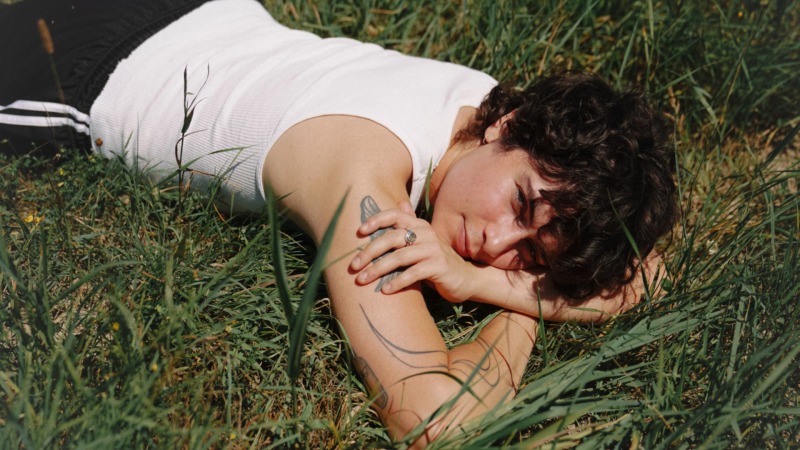Q&A: Bells Larsen Zooms In
The Toronto singer-songwriter sits down with Paste ahead of his new album Blurring Time to talk about change, creating from a place of positivity, and the role of trans narratives in music in 2025.
Photo by Lawrence Fafard
There’s rarely a moment when I’m not writing—or at least thinking about writing. As I tie up the loose ends of my college career, I find myself juggling not just full-time school work, but concert reviews, album retrospectives, and press releases for my senior thesis. It’s a lot, sure, but I love it. I wouldn’t choose this life if I didn’t. If there’s one drawback to being knee-deep in all of it, though, it’s that I see new voices slip through my inbox every single day.
That almost happened with Bells Larsen.
Back in January, when I was first given the opportunity to talk about him, I was waist-deep in deadlines. I nearly passed on the opportunity out of stress alone, but then that voice in my head spoke up: “What if this artist has a story only they can tell? Are you really okay letting that pass you by?” I’m glad I didn’t.
Since that first listen, Bells Larsen has become my Roman Empire—the artist I find myself thinking about on the quiet walks to class and on crowded buses on the way to concerts. He’s been the sole name I bring up whenever I’m asked, “What have you been listening to lately?” And for good reason: His sophomore album, Blurring Time, arrives this Friday via Royal Mountain Records, and it’s a record three years in the making—not out of choice, but out of necessity. It eclipses the typical indie-folk patchwork, anchored by a concept as intimate as it is brilliantly innovative. As Larsen readied his journey with hormone replacement therapy, he recorded his higher range of vocals, only to return to the studio three years later to add harmonies with a newly-deepened vocal register. The result is a tender duet between two selves, past and present.
Still, whenever I introduce someone to Larsen’s music, I let the songs speak for themselves. To have the patience and creativity to embark on such an endeavor is proof enough that Larsen holds something truly special in his music—it’s the keystone of his current artistry, after all—but the songs are still the foundation. My entryway was the sweet, subtle melancholy of “514-415,” the album’s lead single, but with every release since, my admiration has only grown. His sound calls out to the ghosts of Elliott Smith, Nick Drake, Joni Mitchell, yet it’s undeniably rooted in the present—further reinforcing the intent of the album’s title.
Last month, I had the chance to sit down with Larsen and map out his journey—from the sparks of his songwriting to the imminent release of Blurring Time and beyond. At only 27, he carries a sense of clarity and purpose that, even while speaking about the future, keeps a hopeful glint in his eyes—a sense that his best work is still on the way. The following conversation has been edited for clarity.
Paste Magazine: You got your first guitar when you turned 8. Can you take us back to those early years of playing? What drew you to songwriting, and when did you know you wanted to pursue music fully?
Bells Larsen: So, I come from a creative family. My mom studied acting in college. My dad is a children’s author. A lot of my mom’s family has worked in film or TV, so storytelling through artistic means has always been something I’m drawn to, but no one else in my family is a musician. I feel like music was always present, though. There was always music playing, largely folk from the second half of the 20th century, Joni Mitchell, Nick Drake, Cat Stevens, tons of Beatles. My parents still have this coffee book that’s a Beatles anthology, and I swear to God it’s thicker than my head. It’s got every single photo of them from every era. Seeing the different ways of storytelling through song was inspiring, specifically with the Beatles and seeing how they embodied different sounds and characters and moods and all that.
Then my cousin was gifted a guitar for her birthday and I was jealous, so I asked for a guitar and that was [my] eighth birthday present. I didn’t understand that you would actually have to learn, so many years later when I learned what open D tuning was, I was like, “This is what I was looking for when I was a kid! You just strum it and play chords that are pressing down on all of the strings in the same fret. That’s amazing.” I was initially not that stoked to have to go to guitar class and for a while it felt like a chore. I wanted to develop a personalized relationship with my instrument.
That came through taking guitar lessons with this guy who went house-to-house in my neighborhood in Toronto and met the kids where they were at. He wasn’t interested in teaching scales. It was more, “What do you want to learn? What do you want to sound like? What makes music interesting for you?” I learned finger-picking through him. I learned a lot of Beatles songs through him. Then, around high school, I stopped taking guitar lessons and I went to an arts-based high school in Toronto—so, by virtue of being around other artistic people, and also being at the age where I was experiencing life for the first time, that was my foray into songwriting.
How has Toronto, and your later move to Montreal, shaped your sound?
-

-

-

-

-

-

-

-

-

-

-

-

-

-

-

-

-

-

-

-

-

-

-

-

-

-

-

-

-

-

-

-

-

-

-

-

-

-

-

-








































